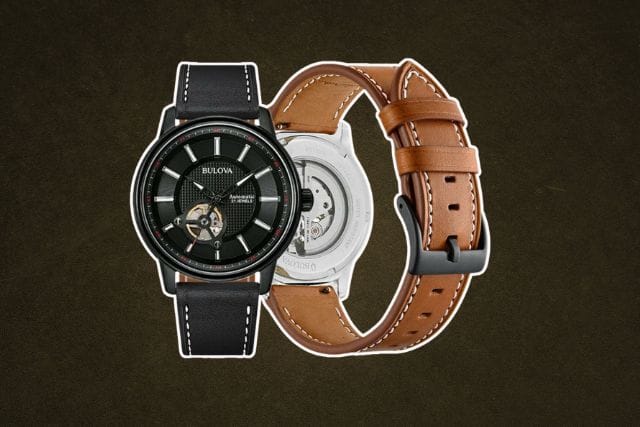Automatic vs. Battery Watch: Making the Right Choice

As an Amazon Associate, I earn from qualifying purchases
When it comes to choosing between automatic watches and battery watches, there are several factors to consider. Automatic watches are powered by the natural motion of the wearer’s wrist, while battery watches rely on a small battery to keep them running.
In this post, we’ll explore the battle of Automatic vs. Battery Watch, as well as the benefits and drawbacks of each.
You may be a watch enthusiast. Alternatively, you could simply be in the market for a new timepiece. Either way, you should understand the differences between automatic and battery watches. This knowledge can help you make an informed decision.
Difference Between Automatic and Battery Watches
Automatic watches are powered by the natural motion of the wearer’s wrist. A rotor spins with the movement to wind the watch’s mainspring. This means that as long as the watch is worn regularly, it will continue running without manual winding or a battery.
On the other hand, battery watches are powered by a small battery that must be replaced every few years once it runs out of power.

One main benefit of automatic watches is their sense of tradition. They represent craftsmanship. Their internal mechanisms are often more intricate and complex. They also do not require the ongoing cost of battery replacement. However, they require regular wear to keep them running, and they can be less accurate than battery watches.
Battery watches, on the other hand, are known for their reliability and accuracy. They require minimal maintenance and can run for years without a new battery. However, they lack the traditional appeal of automatic watches and may not have the same level of craftsmanship.
Pros and Cons of Automatic Watch
Pros
- Utilizes kinetic energy to power the watch, making it eco-friendly and sustainable
- Crafted with precision and intricate details, it is often seen as a symbol of luxury and timelessness.
- It can be appreciated over time as a collectible item
- Requires regular wear to keep functioning properly, encouraging a connection with the watch
Cons
- More expensive than battery-powered watches
- Typically less accurate in timekeeping compared to quartz movements
- Requires regular maintenance and potential trips to the watchmaker for adjustments or repairs
Pros and Cons of Battery Watch
Pros
- Affordable and accessible, with a wide range of price points available
- Highly accurate in timekeeping due to quartz movement technology
- Low maintenance, only requiring a battery replacement every few years
- It can come in a variety of modern and stylish designs
Cons
- Not as environmentally friendly as automatic watches, contributing to battery waste in landfills
- It may not hold the same collectible or sentimental value as automatic watches.
- Batteries will eventually need to be replaced, leading to additional expenses over time. End of Markdown Content
Personal preferences and lifestyle needs
Ultimately, choosing between an automatic and battery-powered watch comes down to personal preference and lifestyle needs. An automatic watch may be the perfect fit for those who value tradition, craftsmanship, and eco-friendliness.
On the other hand, for individuals who prioritize functionality, affordability, and modern design, a battery-powered watch may be more suitable.

Consider your values and daily routine when making this decision. Do you appreciate the artistry and history of an automatic watch? Or do you prefer the convenience and precision of a battery-powered one?
Whatever type you choose, remember that your watch is more than just a timekeeping device – it reflects your personal style and values. So take your time, weigh the pros and cons, and choose the watch that speaks to you. End of Markdown Content
Additional consideration factors
Some additional factors to consider when choosing between an automatic and battery-powered watch include:
The best type of watch for your daily activities
Ultimately, the best type of watch for you will depend on your personal preferences and daily activities. If you value tradition, craftsmanship, and sustainability, an automatic watch may be the perfect fit.
On the other hand, if convenience, precision, and modern design are more important to you, choose a battery-powered watch. It may suit your lifestyle better. Consider your needs and values when deciding and choose the watch that aligns with your unique style.
Conclusion
In conclusion, the choice between automatic and battery watches ultimately comes down to personal preference and lifestyle.
Automatic watches offer a traditional, mechanical appeal. They are powered by the movement of the wearer. Battery watches offer convenience and accuracy. Consider your needs and preferences when choosing between the two types of watches.
FAQ
Can an automatic watch stop working if not worn?
Yes, automatic watches need regular movement to stay powered. If left unworn for a few days, they may stop and require manual winding or wearing to restart.
Is an automatic watch more environmentally friendly?
Yes, automatic watches do not require batteries, reducing electronic waste. Battery-powered watches contribute to battery disposal waste, which may be harmful to the environment.
Which watch is better for daily wear?
Both types are suitable for daily wear. Automatic watches are ideal for those who wear them consistently, while battery watches are better for those seeking a low-maintenance option.
Do automatic watches require maintenance?
Yes, automatic watches need regular servicing every few years to ensure accuracy and longevity. They may also require occasional manual winding if not worn frequently.
As an Amazon Associate, I earn from qualifying purchases









